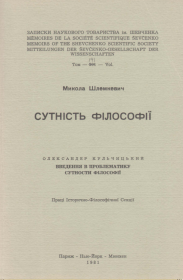The Essence of Philosophy: New York, «Kliuchi», 1981, 254 р.
Keywords:
Metaphysics, science, method, theory of values, religionSynopsis
The book aims to reveal the meaning and role of philosophy, including its relation to other sciences and arts. In particular, the author problematizes the issues of a) development and b) independence of philosophical knowledge. The author comes to the conclusion that there is no specifically philosophical method of inquiry. Philosophy combines with other practices of inquiry and becomes an organic element of a single spiritual culture, generalizing and combining the results of various sciences and arts.
CONTENTS
Introduction
From the biography of Mykola Shlemkevych
The most important works of Mykola Shlemkevych
Editorial work of Mykola Shlemkevych
The most important materials about Mykola Shlemkevych and his work
Oleksandr Kulchytskyi
AN INTRODUCTION TO THE PROBLEM OF THE ESSENCE OF PHILOSOPHY
І
Introductory remarks
Historico-critical part
II
The structure of the work and the structuring of its explanatory and supplementary framing
a) A glance at the structure of the whole work
b) Structuring of the explanatory and supplementary "Introduction" in M. Shlemkevych's work
III
J. Hessen's attempt to define the essence of philosophy in his philosophy textbook "Lehrbuch der Philosophie"
The scheme of division of the trends in philosophy on the basis of the views of J. Hessen
IV
Problems of the train of thought of the historical-critical part of M. Shlemkevych's work
a) Introductory metaphorical hints on the problematic
b) Absolute views in the historico-critical approach: philosophy as a science of values
c) Complementary views on the essence of values in the modern axiology of the phenomenological approach
e) Application of the phenomenological method to the study of values and a complementary view of this method
V
Problems of the historico-critical part of the work on philosophy as a scientific worldview
a) Worldview and world-image
b) Wilhelm Dilthey's philosophy of life as the starting ground of the "theory of worldviews" and the mainstream of M. Shlemkevych's views on philosophy.
c) Categories of life according to Dilthey and their "understanding"
e) Life and worldview in their relationship: genesis and structure of worldviews according to Dilthey
f) Distinguishing the types of worldviews according to Dilthey
g) Consideration of the "sign of hypotheticality" in philosophical worldviews
VI
The problem of philosophy as a set of sciences
a) Problem of merging of the philosophy with the sciences
b) Consideration of the elementary data of the sciences as a subject of the epistemology in the light of its general characteristics
c) Problems of the "merging science with philosophy" at the top of the final scientific generalisations and the characteristic of the "sign" of generality
VII
Problems of relativistic views on philosophy as a generality (set) of heterogeneous systems
a) Relativistic views on the essence of philosophy in the perspective of Hegelianism
b) W. Dilthey's multifaceted and multivalent definition of the philosophy as the basis of M. Shlemkevych's own attitudes
VIII
Plato and Kant's attitude to the problem of defining philosophy
a) Plato on philosophy
b) Kant on philosophy
Systematic part
IX
Philosophy as a critical analysis of spiritual culture (science, art, religion)
a) Philosophy as an epistemological interpretation of the scientific concepts-signs within the framework of the general "theory of signification"
b) Philosophy as an aesthetic interpretation of the givenness of works of art as signs of the expressions of sensual life
c) Philosophy as the philosophy of religion, i.e. the interpretation of religious images-symbols, the contents of religious experience
d) The attitude of phenomenology and existentialism to the philosophy of religion as an addition to the views expressed by M. Shlemkevich
e) The comparison and synthesis of the insights of the analysis of the systems of spiritual culture and its completion "in the idea of a personal monad"
f) The problem of the place of ethics in philosophy as an interpretation of the three systems of culture, science, art and religion
g) Dynamic perspective of the development of "systems of culture" and the position and tasks of "philosophical disciplines" according to Shlemkevych "branches of philosophy", considered in this perspective
X
Philosophy as a metamorphosis: metaphysics as a complete socialisation of philosophical interpretations of cultural systems in the non-apparent reality
a) Subjectivity and hypotheticality of metaphysics
b) Criticism of the intuitive method in metaphysics as an approach that should provide metaphysical cognition with a higher degree of certainty
c) The role of philosophy in the Cartesian "tree of knowledge". Philosophy as the "life sap of the tree of knowledge"
XI
Parallelisms and "points of intersection" between philosophy and essayism as a key to understanding the philosophical work of M. Shlemkevych as a manifestation of the creator
Mykola Shlemkevych
THE ESSENCE OF PHILOSOPHY
Introduction
I Historical and critical part
A Struggle for the concept of philosophy
I Absolutistic views
§ 1 Philosophy as a separate science
§ 2 Philosophy as a scientific outlook – a sign of hypotheticality
§ 3 Philosophy as a general science – a sign of generality
II Relativistic views
§ 4 Philosophy as a set of heterogeneous systems – a sign of universality, integrity
B Classical definitions of philosophy
§ 5 Plato
§ 6 Kant
III Systematic part
§ 7 Critical tasks of philosophy – a sign of universality
§ 8 The preparatory and temporary task of philosophy – a sign of hypotheticality
§ 9 Philosophy as metaphysics – a sign of universality, integrity
Conclusion
Terminological and subject explanations to the work of M. Shlemkevych
Bibliographic references
Index
Downloads




